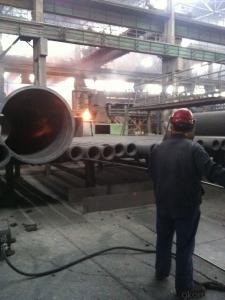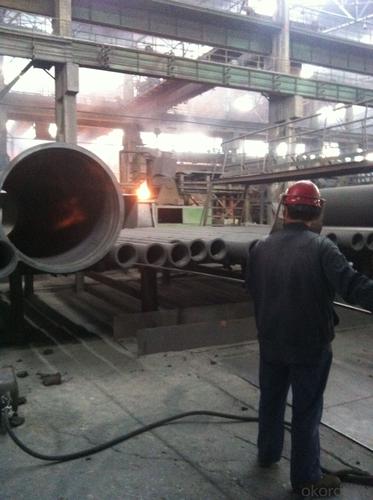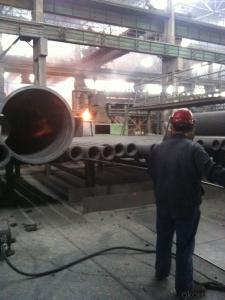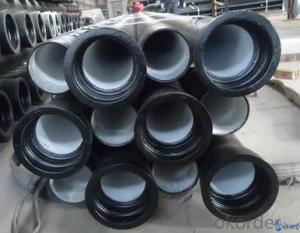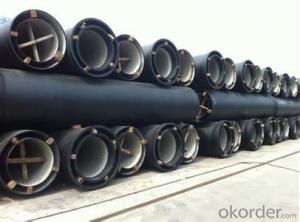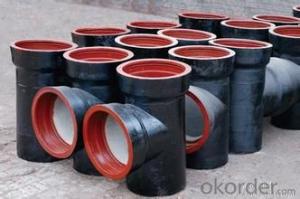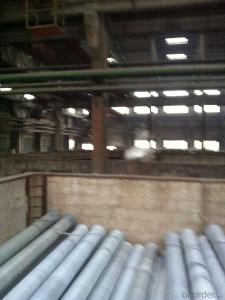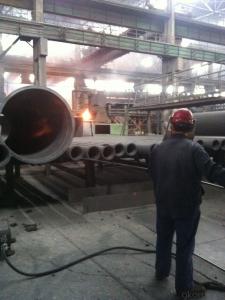DUCTILE IRON PIPES AND PIPE FITTINGS K9 CLASS DN1100
- Loading Port:
- Tianjin
- Payment Terms:
- TT OR LC
- Min Order Qty:
- 22 pc
- Supply Capability:
- 3000 pc/month
OKorder Service Pledge
OKorder Financial Service
You Might Also Like
Material : Ductile Cast Iron
Size Range : DN 80mm to DN 2000mm
Unit Effective Length : 6m or 5.7m
Manufacture Standard: ISO 2531:1998/ EN 545:2006/EN 598:2007
Annual capacity : 200,000 tons
Coating Exterior: Zinc 130g/m2 according to ISO 8179-1 and bitumen coating 70 microns.
Cement Interior: Portland Cement/ High Alumina Cement/ Sulphate Resisting Cement Lining according to ISO 4179
Special requirements on external coating and internal lining can be applied
We also provide accessories such as SBR/EPDM rubber gaskets, lubricant paste, pipe caps, PE sleeves, etc.
Additional Parts:
Each pipe is strictly inspected according to related standard to ensure permanently high performance.
Easy Installation at site and service free for life
Long Service Lifespan
Quotation will arrive you within 24hours once we get your inquiry.
We guarantee offering you a competitive price.
A copy of original inspection reports of pipes will be offered after shipment.
Photos of loading process will be sent to the customer after shipment effect.
We will follow-up the delivery progress after shipment effect and update to the customer on weekly basis.
- Q: What is the maximum pressure rating for ductile iron pipe?
- The maximum pressure rating for ductile iron pipe typically depends on several factors such as the pipe diameter, wall thickness, and the type of joint used. Generally, ductile iron pipe is manufactured to withstand a maximum pressure rating of up to 350 psi (pounds per square inch) or higher. However, it is important to consult the specific manufacturer's specifications and guidelines to determine the exact maximum pressure rating for a particular ductile iron pipe.
- Q: Are ductile iron pipes resistant to soil movement?
- Yes, ductile iron pipes are resistant to soil movement. Ductile iron pipes have a high tensile strength, which allows them to withstand external forces such as soil movement. These pipes are designed to be flexible and are able to absorb and distribute stresses caused by ground settlement or other forms of soil movement. Additionally, ductile iron pipes have a strong and durable construction that can resist the compressive forces exerted by the surrounding soil. Overall, ductile iron pipes are a reliable and resilient choice for underground pipelines, providing long-term stability and resistance to soil movement.
- Q: What is the relationship between continuous cast iron pipe and ductile iron pipe?
- Continuous cast iron pipes are usually grey cast iron pipes. Its tensile strength and elongation are much lower than those of nodular cast iron. In chemical composition, grey cast iron has less carbon content than nodular cast iron. According to the organization, the graphite form of gray iron is flaky, and the graphite form in spheroidal graphite cast iron is spherical.
- Q: Can ductile iron pipes be used for pressure reducing stations?
- Yes, ductile iron pipes can be used for pressure reducing stations. Ductile iron pipes are known for their high strength and durability, making them suitable for handling high-pressure applications. They have excellent resistance to corrosion and can withstand the mechanical stresses and strains associated with pressure reducing stations. Additionally, ductile iron pipes have a smooth interior surface, which reduces friction losses and helps maintain a constant and controlled pressure within the system. Therefore, ductile iron pipes are a reliable and commonly used material for pressure reducing stations.
- Q: Are ductile iron pipes suitable for use in irrigation sprinkler systems?
- Ductile iron pipes, known for their durability, strength, and corrosion resistance, are a suitable option for irrigation sprinkler systems. With their high tensile strength, they can withstand heavy loads and high pressure, ensuring a consistent water supply. Moreover, their long lifespan reduces the frequency of maintenance and replacement, making them cost-effective. In summary, ductile iron pipes are reliable and appropriate for use in irrigation sprinkler systems.
- Q: How do ductile iron pipes perform in extreme weather conditions?
- Ductile iron pipes are renowned for their outstanding performance when faced with harsh weather conditions. Crafted from an iron alloy infused with small quantities of carbon and other elements, these pipes exhibit unparalleled strength and resilience, rendering them highly impervious to the effects of extreme weather. In soaring temperatures, ductile iron pipes maintain their structural integrity without succumbing to softening or deformation, unlike certain other materials. This ensures that the pipes continue to function optimally and reliably, even in scorching heat. Furthermore, these pipes boast a remarkable resistance to thermal expansion, thereby minimizing the risk of pipe distortion or joint failure during temperature fluctuations. When confronted with frigid conditions, ductile iron pipes also excel. They possess a low coefficient of thermal expansion, translating to a reduced likelihood of cracking or fracturing due to freezing temperatures. Moreover, their robustness and flexibility enable them to withstand the pressure exerted by freezing water inside the pipes without incurring significant damage. In addition, ductile iron pipes exhibit superb corrosion resistance, demonstrating their ability to withstand the detrimental effects of harsh chemicals, saltwater, and other corrosive substances that may be present in extreme weather conditions. This corrosion resistance ensures the longevity and dependability of the pipes, preventing leaks and preserving water quality. In terms of durability, ductile iron pipes are designed to endure heavy loads and external stresses. Boasting high tensile strength, they display resistance to bending and breakage. This characteristic proves crucial in extreme weather conditions where heavy rainfall, powerful winds, or even seismic activities may occur. All in all, ductile iron pipes have a well-established reputation for delivering exceptional performance in extreme weather conditions. Their strength, resilience, thermal stability, corrosion resistance, and durability render them a reliable choice for a multitude of applications, including water supply, sewage systems, and industrial pipelines, even in the most challenging weather environments.
- Q: What is the maximum temperature that ductile iron pipe can handle?
- The ability of ductile iron pipe to withstand high temperatures varies depending on factors such as the grade of ductile iron, the length of time exposed to heat, and the presence of external factors like corrosive environments. In general, ductile iron pipes can tolerate temperatures up to 400-450 degrees Fahrenheit (204-232 degrees Celsius) for short periods. However, it is crucial to refer to the manufacturer's specifications and guidelines to determine the exact maximum temperature limits for a specific grade of ductile iron pipe. Additionally, it is advisable to consider the consequences of thermal expansion, potential loss of mechanical properties, and any additional protective measures that may be necessary when operating at elevated temperatures.
- Q: How to correctly measure ductile iron pipe
- This need to find the right tools, Michi, caliper, amount to ductile pipe and pipe fittings and pipe fittings of the outer diameter, inner diameter, length and wall thickness were measured, eleven.
- Q: What is the process of fusion bonding for ductile iron pipes?
- The process of fusion bonding for ductile iron pipes involves joining two or more pipes together using heat and pressure to create a strong and durable bond. This technique is particularly used in the construction and installation of underground water, sewer, and gas pipelines. The first step in the fusion bonding process is to clean and prepare the surfaces of the pipes to be joined. This involves removing any dirt, debris, or rust that may interfere with proper bonding. Specialized cleaning tools and techniques, such as wire brushing or sandblasting, are often employed to ensure a clean and smooth surface. Once the surfaces are prepared, the pipes are aligned and clamped together. A fusion bonding machine, also known as a fusion welder, is then used to apply heat and pressure to the joint area. The fusion bonding machine consists of heating elements that are positioned around the joint and a hydraulic system that applies the necessary pressure. The heating elements are typically electric or gas-powered and are designed to reach temperatures high enough to melt the ductile iron material. As the heat is applied, the ductile iron surfaces begin to soften and fuse together, creating a strong bond. The pressure from the fusion bonding machine ensures that the molten iron flows evenly and uniformly between the joint surfaces, promoting a seamless connection. The duration of the fusion bonding process varies depending on the size and thickness of the pipes, as well as the specific requirements of the project. Once the fusion bonding is complete, the joint is allowed to cool and solidify, forming a permanent and leak-proof connection. Fusion bonding offers several advantages for ductile iron pipes. It provides a reliable and durable joint that can withstand high pressure, temperature variations, and external loads. The seamless connection also minimizes the risk of leaks, which is crucial for underground pipelines that transport water, sewage, or gas. Overall, fusion bonding is a widely used technique for joining ductile iron pipes, ensuring their structural integrity and longevity in various infrastructure projects.
- Q: Are ductile iron pipes suitable for horizontal directional drilling?
- Yes, ductile iron pipes are suitable for horizontal directional drilling due to their high strength and flexibility, which allows them to withstand the stress and bending forces during the drilling process.
Send your message to us
DUCTILE IRON PIPES AND PIPE FITTINGS K9 CLASS DN1100
- Loading Port:
- Tianjin
- Payment Terms:
- TT OR LC
- Min Order Qty:
- 22 pc
- Supply Capability:
- 3000 pc/month
OKorder Service Pledge
OKorder Financial Service
Similar products
Hot products
Hot Searches
Related keywords
